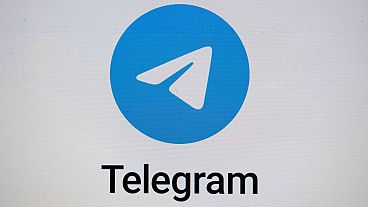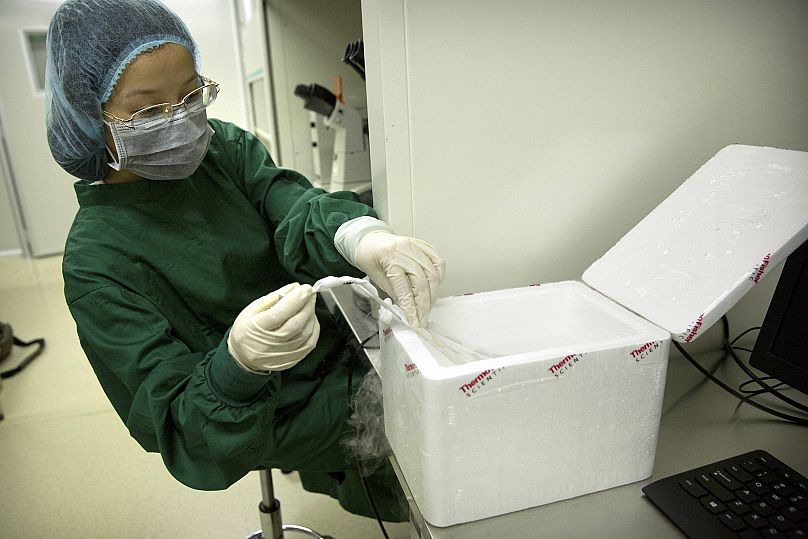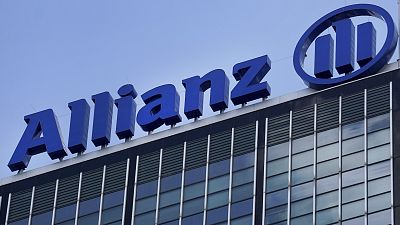In the global race for talent, firms are looking for new ways to attract and retain the best employees.
If you’re lucky enough to be a sought-after worker, the perks you're offered can be vast and varied.
In an attempt to keep you keen, your employer will be likely to offer you a raft of goodies - say educational support or commuter expenses.
Big tech, along with banking and pharma firms, are ahead of the game when it comes to persuasion. A hunger for talent, combined with stellar profits, goes a long way to drive generosity.
Right back in 2014, Apple and Facebook made headlines when they became the first major US employers to announce the coverage of egg freezing for staff.
"We continue to expand our benefits for women, with a new extended maternity leave policy, along with cryopreservation and egg storage as part of our extensive support for infertility treatments," said Apple at the time.
Collecting and freezing a woman's eggs allows them to be preserved from ageing outside the body, meaning that children can be conceived at an older age.
If and when a woman decides to unfreeze these eggs, they can be fertilised in a laboratory.
The hope is that at least one of these so-called "zygotes" will develop into an embryo, although there's no guarantee of success.
Prevalence of egg-freezing benefits
Offering coverage up to $20,000 (€18,334) would, Apple argued, "empower" employees "to do the best work of their lives".
Whether or not this is true, Apple's announcement prompted a flurry of firms to offer similar egg-freezing benefits, including Google, Yahoo, and Netflix.
According to the consultancy firm Mercer, the number of large US companies offering coverage for non-medical egg-freezing grew to 19% in 2023. That's up from 16% in 2022.
In Europe, these benefits are less common, although that doesn't mean they're not available.
In the UK, employers including Natwest bank, energy supplier Centrica, and law firms Clifford Chance and Cooley offer financial support to staff undergoing fertility treatment.
This can relieve a heavy financial burden, particularly as non-medical egg freezing is rarely provided on the NHS.
According to the UK's fertility regulator HFEA, the whole process for egg freezing and thawing costs an average of £7,000 to £8,000. For women who require more egg collection cycles, this total can be higher.
Fertility benefits are not solely confined to anglophone countries either. In Switzerland, the pharmaceutical firm Merck financially supports employees wanting to freeze their eggs, and Swedish music giant Spotify also has a similar policy.
"Since 2021, every full-time employee at Spotify globally is eligible to claim the company's family-forming benefits," Katarina Berg, Chief Human Resources Officer at Spotify, told Euronews.
This allowance can be used for IVF, donor services, adoption, fertility preservation or fertility assessments and education, she explained. The amount varies from country to country, but it is enough to cover "several IVF cycles".
Expectations to delay parenthood?
Although companies offering egg freezing - like Spotify - can also provide generous parental leave, some ethicists have expressed concerns about reproductive autonomy.
If women feel pressured to delay parenthood, the argument follows that egg freezing could actually be hindering workplace equality.
Known as the "motherhood penalty", the effect of childbirth on women's careers has been widely documented.
Experts have suggested that, compared with women who don't have children, women with children are more likely to be paid less and see fewer promotions.
One key reason for this, in the developed world at least, is the cost of childcare. If a parent's salary is eaten up by this expenditure, mothers - more so than fathers - often feel economically pressured to give up work.
For those fearful of falling behind, egg freezing can therefore seem like an attractive option.
One way to tackle this pressure, according to experts, is to ensure that egg freezing doesn't come at the expense of parent-friendly benefits.
For starters, generous pay for those taking maternity or paternity leave can help. The option for new parents to work flexibly can also make it easier for them to continue working. A number of firms, although they're in the minority, are even providing childcare in the office.
Is work a deciding factor?
While it's possible that some mothers feel pressured to freeze their eggs for professional reasons, it's also important to note that many women are motivated by other factors.
Anthropologist Marcia C Inhorn, for example, has suggested that a number of women are driven to delay parenthood as they find themselves without a partner.
In her book, "Motherhood on Ice", she writes of her 150 interviewees: "Egg freezing was not about their careers. It was about being single or in very unstable relationships with men who were unwilling to commit to them."
For Annabel Robbins, a woman now going through her fourth egg collection cycle, these testimonies resonate.
A legal assistant based on the Isle of Wight, she told Euronews that she first decided to freeze her eggs aged 35 with the Complete Fertility clinic.
"I didn't have a partner at the time. And I think I was concerned that it might take a while to find somebody. And if I didn't find somebody, I didn't want to completely lose all chances of having children," Annabel explained.
"I've always had quite an active life and children just hadn't really been at the forefront… And then one day I was 35 and I thought: 'Ok - let me sort this out.' But I don’t think work was a deciding factor."
Annabel's treatment wasn't paid for by her employer, although she was allowed to take a small amount of paid leave.
Company-sponsored egg freezing could be, she argued, a positive step - but she also stressed the importance of having a workplace culture that's supportive of fertility matters.
"For the last two years, certainly, my anxiety has been worse. I wake up with this sort of metaphorical clock above my head thinking, you know, is this going to be the last egg?"
"I thought it'd be best to let my employer know that I might not be my tip-top, bubbly self. They were very supportive and understanding of that."
It's all about choice
Natalie Silverman, co-founder of the UK advocacy group Fertility Matters at Work, also spoke to Euronews about how employers can better handle conversations around fertility.
As many companies don't have formal policies on the matter, this means that many workers are reluctant to take time off.
On top of this, they're often not open with their employer about their treatment.
Recounting testimonies of individuals she has worked with, Natalie explained: "They often felt guilty that they were offloading [tasks] onto colleagues, or they were having to tell lies about what they were doing. Sometimes they were at the fertility clinic and still had to be on their laptop."
By speaking with companies and employees, Fertility Matters at Work is hoping to change these patterns in the workplace.
Natalie also stressed that, regarding company-financed egg freezing, this option could be "empowering" in the right conditions.
Egg freezing isn't a guaranteed way to ensure pregnancy, she said, so women should be reminded of this.
"It has to be done with the right type of information and education, but we feel it's not exploitative for women to have it as an option."
Similar to how the contraceptive pill revolutionised bodily autonomy in the 1970s, affordable egg-freezing could have the potential to drastically shift women's relationship with their fertility.
Informed choice, according to experts, remains key.
















